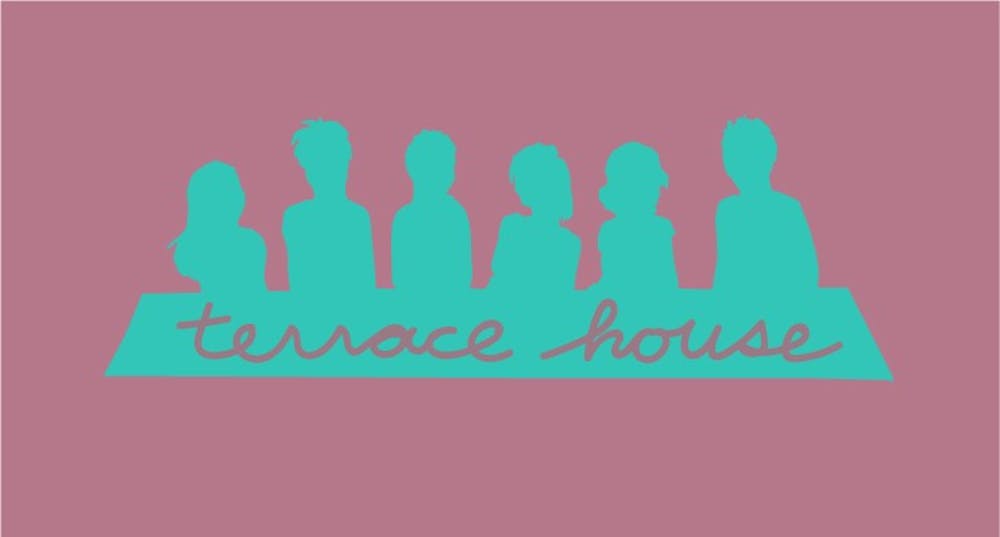Some people live to watch camera confessionals, wine throwing, and rich people crying; and some can’t stand it at all. However, if you’ve ever wanted a happy medium between “reality” television and real life, look no further. Terrace House, a Japanese gem of reality TV hidden away on Netflix, is the kind of show that both sides of the divide might be able to get behind.
The central action of the show revolves around a group of six strangers—three men and three women—who live in a house together, share an automobile, work, go to school, and socialize almost exclusively with each other. The trappings of the show might sound like The Real World or Big Brother, but as soon as it starts, it becomes remarkable how little Terrace House has in common with any of its American counterparts. In the opening of every episode, Terrace House claims to be entirely unscripted; but unlike most other reality television shows, watching it actually makes you believe that might be true.
There is very little clearly defined drama on Terrace House, and if you are a reality television viewer who is accustomed to fighting, it will throw you for a loop. There’s a scene at the very beginning of the show where, one by one, the house’s residents filter into the living room with rolling suitcases on the first day. Makoto, a baseball playing student and the first to arrive, begins to make small talk with model Midori—and like real–world small talk, it is unremarkable and awkward. You expect that the next person who comes in will shake things up, but as more people arrive—Yuki, a tap dancer, Mizuki, an office worker and barista, Tatsuya, a hairstylist, and Yuriko, a medical student—no divas reveal themselves, and no artificially manufactured conflict arises. It dawns on you that this is a normal meeting between humans about to live together, fraught with the politeness and low–stakes drama of any such meeting, and it becomes absolutely riveting to watch it unfold on screen.
Terrace House is concerned with believability, almost to a fault. It depicts the banalities of day to day life, like doing dishes and living room card games, with such careful attention that the pacing drags and it borders on boring. But it has the effect of elevating the smallest concerns—two men joking about girls in swimsuits, or roommates eating their friend’s “special meat”—into intense moments of drama that spawn episode plot–lines and Internet debates. It also has the effect of providing an excellent contrast for the philosophical territory that the show delves into in its best moments. Terrace House shines in quiet moments at the end of the day, when the friends gather to talk about their dreams, their futures, and how to navigate life and love.
Romance is a central theme of the show. When Tatsuya reveals that he is single and in the house to look for a girlfriend, he is met with derision and suspicion, even though it quickly becomes obvious that looking for love is the reason everyone is there. The show is careful to keep an even gender ratio, and genders often segregate themselves to talk about pursuing their counterparts. Perhaps Terrace House isn’t that atypical in its unfortunate heteronormativity, but there are several moments—when Yuki remarks “I think the women can make good use of this” upon seeing the new kitchen, or when the men sit around the dinner table and berate Mizuki for having “confusing” dreams to open a coffee shop—that, subtle as they may be, leave a bad taste in the mouth.
However, for this, and for everything else you could possibly object to about Terrace House, there is a diverse panel of comedians at the ready to mock the house’s inhabitants. Sometimes completely on the nose and sometimes bafflingly mean in comparison to the politeness of house residents—such as when they go after Tatsuya for having a “high voice”—the scenes that take a break to feature the panel bring a biting humor and honest charm to Terrace House, even in the show’s weaker moments.
From “special meat” to existential conversations, Terrace House is a show that is completely unlike anything American reality television has to offer. If you are looking for a show with drama and bombast, search elsewhere—but if you’re looking for an authentic series with a lot of heart, Terrace House might just become your new favorite reality TV show.

